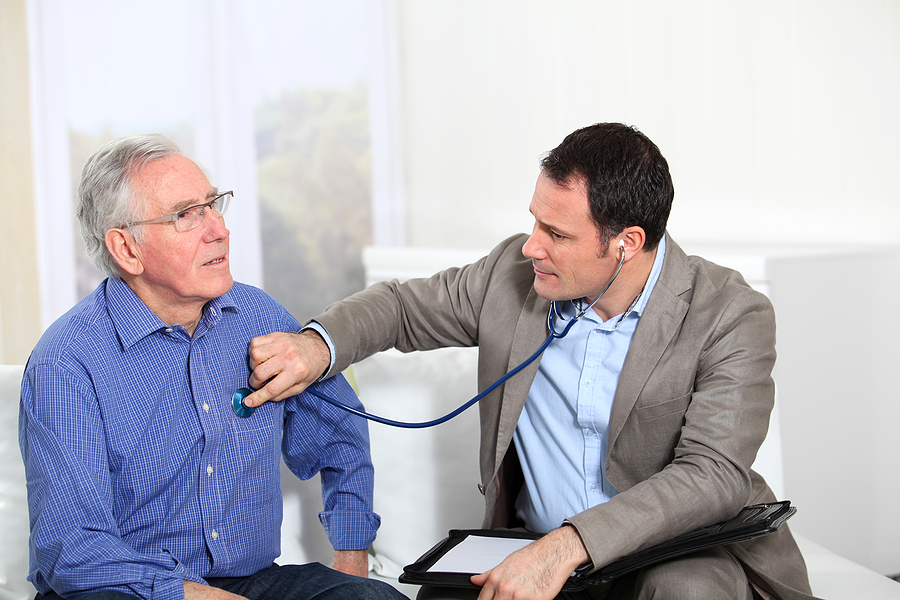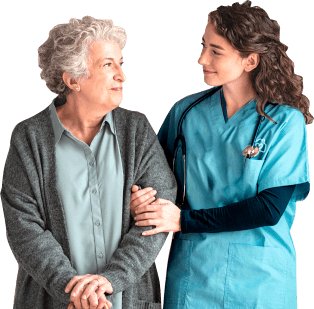What is Cancer?
Every day, healthy cells in our body divide to replace old or damaged cells in a controlled and orderly manner. Cancer cells, however, grow and survive when they should not. This leads to cells multiplying uncontrollably, often forming tumours.
These cancerous cells build up in our body, depleting oxygen and nutrients that would otherwise be used to nourish healthy cells. This can lead to an impaired immune system and other problems that prevent our body from functioning regularly.
How does cancer start?
Cancer starts when a change happens in our genes during cell division. Often, cancerous cells are first found in one area, then spread throughout our body via the lymph nodes. This process is called metastasis.
This mutation can happen by chance but the risk of occurrence may be influenced by external factors such as smoking. Some people may also inherit genes that make them more likely to develop cancer.
How many types of cancer are there?
Cancers are named based on the area they begin in and the type of cells they are made of. For example, cancer that begins in the lungs is called lung cancer, even if it has spread to other parts of the body.
There are over 100 types of cancers, but we can generally classify them into 5 main categories:
- Carcinoma is the most commonly diagnosed form of cancer and originates in the skin or tissues that line organs. Lung, breast and skin cancers fall under this category.
- Melanoma arises in the cells that make the pigment in our skin.
- Lymphoma is a form of cancer that affects our immune system.
- Sarcoma refers to cancers of connective tissues and is relatively uncommon.
- Leukemia refers to the cancer of the blood and does not usually form solid tumours.
Which cancer is the most aggressive?
Despite medical advancement, cancer remains a leading cause of death worldwide. In Australia, the top cancers based on the number of lives claimed are:
- Prostate cancer
- Breast cancer
- Colorectal (bowel) cancer
- Melanoma cancer
- Lung cancer
Causes of Cancer
Our risk of developing cancer is determined by a number of factors, some of which are within our control and others that are not.
In general, the mutation of a healthy cell into a cancerous one is a result of the interaction between an individual’s genetic factors and external agents, including:
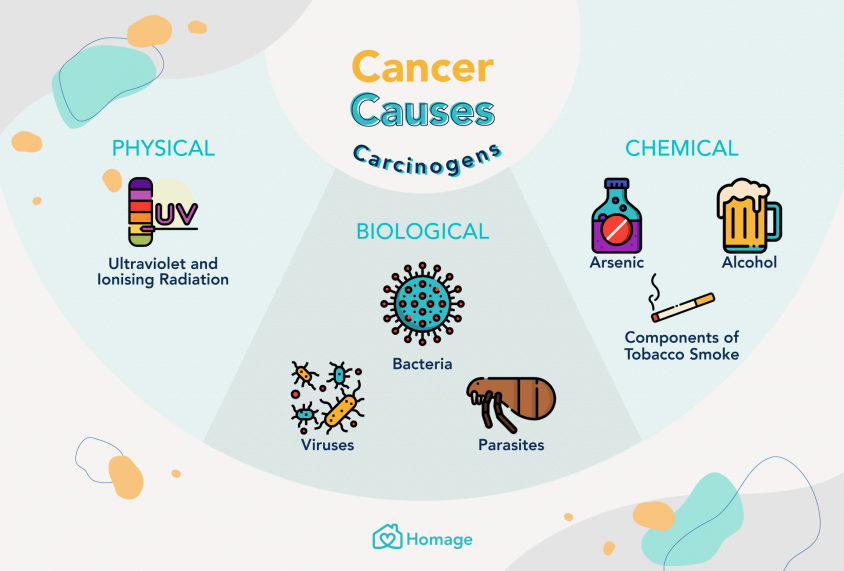
- Physical carcinogens such as ultraviolet and ionising radiation
- Chemical carcinogens such as alcohol, components of tobacco smoke and arsenic
- Biological carcinogens such as viruses, bacteria or parasites
Cancer Prevention
While we may not be able to control all the risk factors, we may be able to reduce our chances of developing cancer by limiting our exposure to carcinogens. Here are some examples of how we can minimise our exposure to the different types of carcinogens in our daily lives.
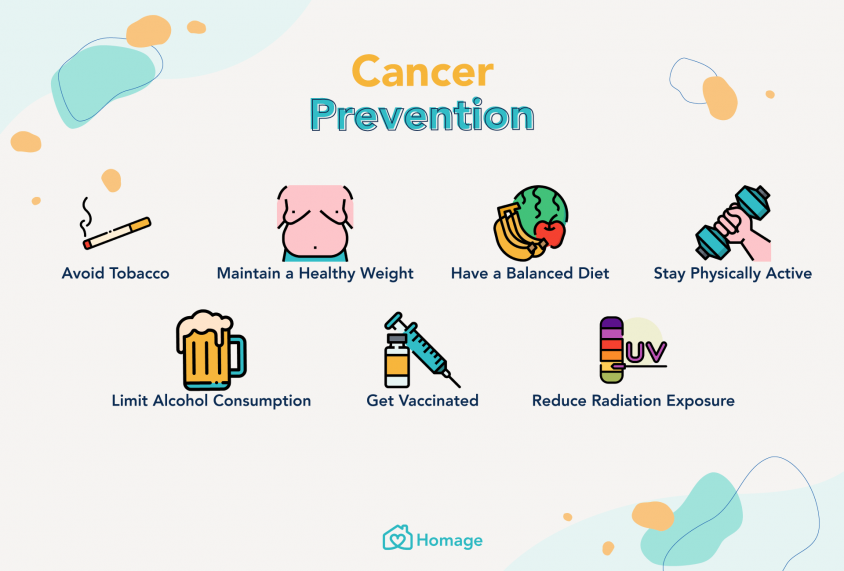
Avoid Tobacco
A single puff of tobacco smoke contains more than 60 well-established carcinogens and is the single most important risk factor for cancer, responsible for approximately 22% of cancer-related deaths globally. If you don’t smoke, don’t start. If you do smoke, get support and quit smoking today to reduce your cancer risk.
Maintain a Healthy Weight
Obesity can lead to a host of health issues, including many types of cancer. Calories matter. If you need to lose weight, watch your diet and consume less calories, while burning more with exercise.
Have a Balanced Diet
The type of food we consume may increase our risk of developing cancer. Adopt a diet rich in fruits, vegetables and whole grains, and avoid saturated fat and red meat to keep cancer at bay.
Stay Physically Active
Besides keeping our weight in check, physical activity brings about many health benefits, such as boosting our immune system, which helps to protect us against cancer.
Limit Alcohol Consumption
The more alcohol we drink, the higher our risk of developing an alcohol-associated cancer, including mouth, liver and colon cancer. If you choose to drink, limit your alcohol intake to no more than one drink a day.
Get Vaccinations
Infections caused by hepatitis B and human papilloma virus (HPV) can lead to cancers. Thankfully, vaccines are available for some of these viruses, and can help to lower our risk of certain types of cancer.
Reduce Radiation Exposure
Radiation from natural and man-made sources can increase our risk of cancer, but there are preventive measures we can take to protect ourselves from radiation exposure, such as applying sunscreen before going outdoors and wearing protective clothing.
Cancer Symptoms
Individuals may experience symptoms to varying extents depending on the body part affected, stage of cancer and other factors. However, having these symptoms does not necessarily mean you have cancer, as it may be caused by many other conditions.
If you experience any of the following symptoms and they persist or worsen, please consult a doctor for further evaluation.
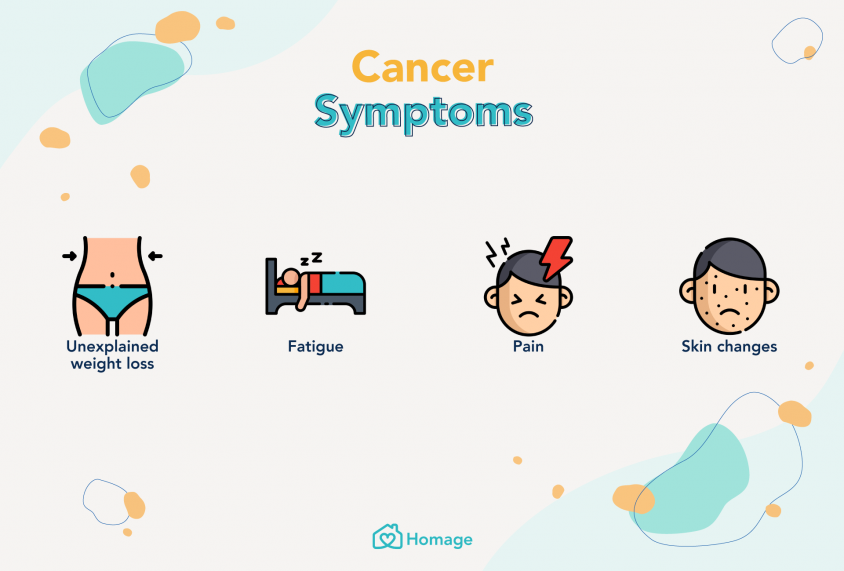
Unexplained weight loss
We all experience fluctuations in weight at some point. However, if you are losing weight for no known reason, it may indicate an issue with your digestive tract. People with stomach, esophagus, pancreas or lung cancer are likely to experience unexplained weight loss.
Fatigue
Feeling tired once in a while is perfectly normal, but if you find that your fatigue does not get better with rest, it could be a symptom of cancer or other underlying health issues. Persons with cancer often experience extreme fatigue as the cancer spreads, but it can also happen in the early stages of cancers such as leukemia. Colon or stomach cancer may cause blood loss, resulting in fatigue as well.
Pain
Depending on the type and stage of cancer, individuals may experience pains and body aches at different parts of the body. For example, a headache that does not go away or improve with treatment may be a symptom of a brain tumour. Often, pain caused by cancer means that it has already spread across the body.
Changes in skin colouration
Unusual changes in our skin may be a symptom of cancer. Skin may appear darker, yellowish or red, and may feel dry and itchy. Besides skin cancer, persons with breast cancer may also experience these texture changes around the breast.
There are other signs and symptoms of cancer that we can look out for, many of which are specific to the type of cancer.
Stages of Cancer
Most cancers can be broadly classified into 5 stages according to how advanced the cancer is:
- Stage 0 cancer: no cancer; presence of abnormal cells with the potential to become cancer
- Stage I (early-stage) cancer: cancer is small and limited to one area
- Stages 2 and 3 cancer: cancer is larger and has grown into nearby tissues or lymph nodes
- Stage 4 (advanced or metastatic) cancer: cancer has spread to other parts of the body
Cancer Diagnosis
Early detection is key in cancer treatment. Without prompt diagnosis, individuals may only discover cancer at the later stages where they can only turn to palliative care, with no option of curing it.
By having an awareness of cancer signs and symptoms, we will be able to identify when something is amiss and seek medical intervention promptly.
For some cancers, there may be no signs or symptoms at all in the early stages. This is why regular screening is important in helping us detect and diagnose cancer early, so that affected individuals can get access to prompt treatment and have a higher chance of recovery.
Cancer Treatment
Treatment for cancer patients goes beyond curing them of the disease. Providing holistic people-centred care is important.
First of all, the goals of treatment should be determined – whether it is to cure the cancer, prolong life, or improve the patient’s quality of life. This then governs the type of treatment that should be administered. Oftentimes, besides curative treatment, palliative care and support groups can help a person who is diagnosed with cancer.
Curative Treatment
Most of the time, treatment can cure cancer when detected early. Usually, a combination of procedures, such as surgery, radiotherapy and chemotherapy, will be used.
Palliative Care
If the cancer is detected at a later stage where there is no curative treatment available, or when curative treatment proves to be no longer effective, palliative care may be recommended. This form of care aims to improve quality of life by alleviating pain and symptoms, providing greater comfort to the individual.
Palliative care is often misunderstood as a form of care used only when curative treatment is no longer effective. However, palliative care can also be carried out in conjunction with curative treatment to relieve pain and symptoms caused by the procedures that the individual underwent (e.g. to alleviate the nausea caused by chemotherapy) or the cancer itself.
Support for Cancer Patients
From receiving a cancer diagnosis to undergoing treatment, the experience can be stressful for both the patient and the caregiver. Besides addressing the physical impact of cancer, we cannot neglect our emotional, psychosocial and spiritual needs as well.
Having a fuller understanding of the condition, the treatment options available, and knowing what to expect after receiving a diagnosis can be helpful in soothing our nerves and giving us a sense of reassurance. To support cancer patients and families, the Cancer Council provides online resources and toolkits on the different cancer types as well as helpful care tips, ranging from cancer-friendly diets to emotional wellbeing in the face of cancer. There are also workshops, talks and programmes available to help address concerns that we may face across the cancer trajectory.
Fighting cancer is not easy, but you don’t have to go through it alone. Through sharing of personal experiences and tips to cope with cancer and treatment, joining a support group can help us gain insight on what to expect in our cancer journey and garner support from one another. Find a support group most suitable for you and your loved ones here.
Living with Cancer
Having to deal with the disease and its symptoms, undergo treatment, manage our emotions, and adapt to a new routine of medical appointments can be physically and mentally draining. However, remember that you are not alone in your cancer journey and help is always available.
If you need care support for yourself or a loved one with cancer, reach out to our Care Advisors at 1300 705 029.
- Alcohol and Cancer Risk. National Cancer Institute. (2018). Retrieved 12 May 2020, from https://www.cancer.gov/about-cancer/causes-prevention/risk/alcohol/alcohol-fact-sheet#how-does-alcohol-affect-the-risk-of-cancer
- Cancer. World Health Organization. (2018). Retrieved 12 May 2020, from https://www.who.int/news-room/fact-sheets/detail/cancer
- Cancer prevention. World Health Organization. Retrieved 12 May 2020, from https://www.who.int/cancer/prevention/en/
- Common Types of Cancer in Singapore. Singapore Cancer Society. (2016). Retrieved 30 July 2020, from https://www.singaporecancersociety.org.sg/learn-about-cancer/cancer-basics/common-types-of-cancer-in-singapore.html
- DerSarkissian, C. (2019). Stages of Cancer. WebMD. Retrieved 12 May 2020, from https://www.webmd.com/cancer/cancer-stages#1
- How cancer starts. Cancer Research UK. (2017). Retrieved 12 May 2020, from https://www.cancerresearchuk.org/about-cancer/what-is-cancer/how-cancer-starts
- How Tobacco Smoke Causes Disease: The Biology and Behavioral Basis for Smoking-Attributable Disease: A Report of the Surgeon General. (2010).
- Metastatic Cancer. National Cancer Institute. (2017). Retrieved 12 May 2020, from https://www.cancer.gov/types/metastatic-cancer
- Physical activity. World Cancer Research Fund. Retrieved 12 May 2020, from https://www.wcrf.org/dietandcancer/exposures/physical-activity
- Pichardo, G. (2020). Basics of Cancer. WebMD. Retrieved 12 May 2020, from https://www.webmd.com/cancer/understanding-cancer-basics
- Signs and Symptoms of Cancer. American Cancer Society. (2014). Retrieved 12 May 2020, from https://www.cancer.org/cancer/cancer-basics/signs-and-symptoms-of-cancer.html
- The Global Cancer Observatory. (2019). Singapore [Fact sheet]. https://gco.iarc.fr/today/data/factsheets/populations/702-singapore-fact-sheets.pdf





